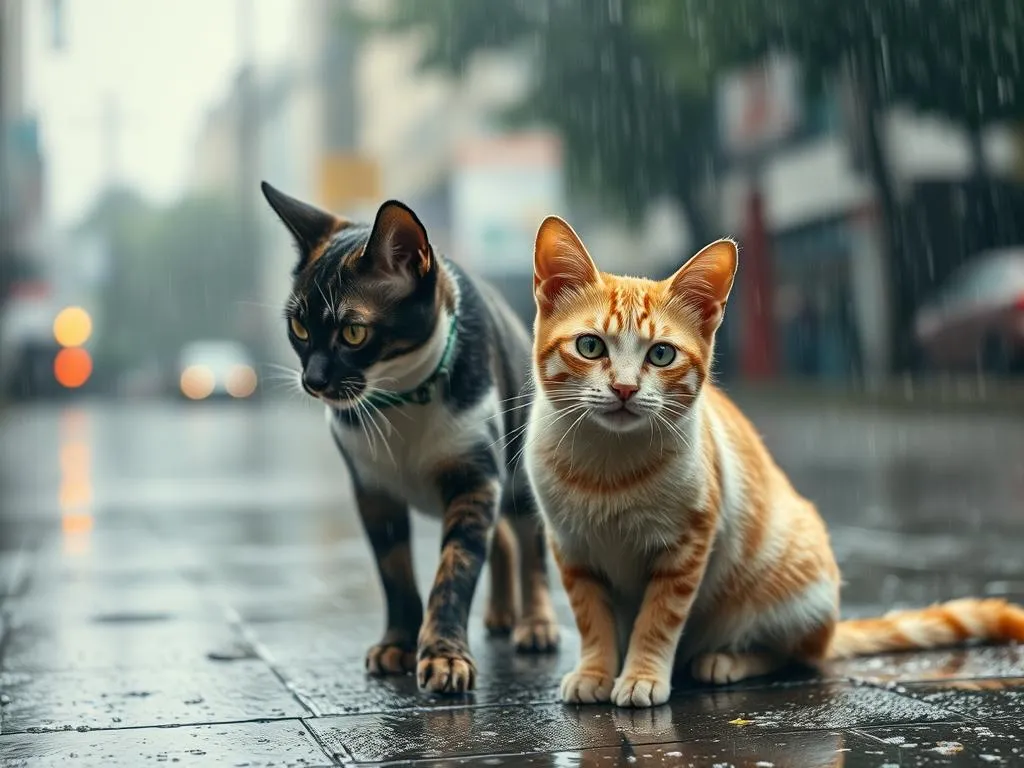
Introduction
When you hear the phrase “raining cats and dogs,” it often evokes a vivid image of a torrential downpour. But what does this quirky idiom really mean? In essence, it refers to heavy rain, an expression that has made its way into the everyday vernacular of English speakers. Understanding the context and nuances of such idioms can enrich our language comprehension and enhance our conversation skills.
Idioms like “raining cats and dogs” play a crucial role in everyday dialogue. They not only add color and flair to our speech but also convey meanings that are often more impactful than literal descriptions. In this article, we will delve into the origins, meanings, cultural references, and modern usage of this intriguing phrase.
Historical Background
Origins of the Phrase
The exact origins of “raining cats and dogs” are somewhat murky, with several theories attempting to explain how this peculiar expression came to be. One of the most common theories suggests that the phrase emerged in 17th-century England, possibly as a humorous exaggeration of the chaos and noise associated with heavy rain. Some etymologists have linked it to the Old English word “catadupe,” meaning “waterfall,” though this connection remains speculative.
Cultural references abound, with notable mentions in literature. For instance, the phrase appears in Jonathan Swift’s 1710 poem “A Description of a City Shower,” where he vividly describes the chaotic scenes of a rainstorm. Over time, the phrase has evolved, becoming a staple in both spoken and written English.
Evolution of Usage
The evolution of the phrase “raining cats and dogs” mirrors societal changes and the way language adapts. Originally found mostly in poetry and literary works, it has transitioned into everyday conversation. Today, we see variations of the phrase used in various forms of media, including television shows, movies, and even social media.
Interestingly, similar idioms exist in other cultures. For example, in French, one might say “il pleut des cordes,” which translates to “it’s raining ropes,” while in Spanish, the equivalent is “está lloviendo a cántaros,” meaning “it’s raining from pitchers.” These comparisons highlight the universal nature of expressing heavy rain, albeit through different imagery.
Literal vs. Figurative Meaning
Literal Interpretation
If we were to interpret “raining cats and dogs” literally, one might envision a bizarre weather phenomenon where pets are falling from the sky. This visualization is not only absurd but also serves to illustrate the idiomatic nature of the phrase. It emphasizes the overwhelming amount of rain, akin to a chaotic scene with animals tumbling down.
Figurative Meaning
In its figurative sense, “raining cats and dogs” signifies an exceptionally heavy downpour. The phrase is often used in casual conversations to describe sudden and intense weather conditions. For instance, one might say, “I forgot my umbrella, and now it’s raining cats and dogs!” This expression effectively conveys the urgency and discomfort of being caught in such a storm.
Common contexts for using the phrase include weather forecasts, casual discussions about the weather, or even in a metaphorical sense to describe overwhelming situations in life. The idiom captures the essence of experiencing something unexpected and powerful, making it a relatable expression.
Usage in Modern Language
Common Contexts
Today, “raining cats and dogs” is frequently used in casual conversations, news reports, and even social media posts. Picture a scenario where friends are planning an outdoor picnic, and someone checks the forecast only to find that it’s going to be “raining cats and dogs.” This phrase effectively communicates the need for a change of plans without delving into too much detail.
Additionally, the phrase can also be used metaphorically in non-weather-related contexts. For example, one might say, “With all the work piling up, it feels like it’s raining cats and dogs at the office!” Here, it conveys a sense of being overwhelmed by tasks.
Variations and Alternatives
While “raining cats and dogs” is a vivid expression, there are several alternatives and variations that convey similar meanings. Phrases like “pouring,” “coming down in buckets,” or “raining heavily” can be used interchangeably, though they lack the quirky charm of the original idiom.
Regional Differences
Interestingly, the usage of “raining cats and dogs” can vary across English-speaking regions. In the UK, it is commonly understood and used, while in the US, it might be less frequently employed, with alternatives like “it’s pouring” or “it’s a deluge” taking precedence. Such regional differences in idiomatic expressions highlight the rich diversity of the English language.
Cultural References
In Literature and Media
The phrase “raining cats and dogs” has made its mark in various forms of literature and media. Beyond Jonathan Swift’s early references, it has been featured in numerous songs, movies, and literary works. For instance, in the classic film “Singing in the Rain,” the weather plays a significant role in the characters’ experiences, reflecting the emotional states of the protagonists.
Moreover, contemporary authors often utilize this idiom to create imagery and evoke emotions. Whether in a lighthearted romance or a suspenseful thriller, the phrase serves as a relatable reference point for readers.
Impact on Pop Culture
The phrase has transcended its literal meaning, becoming a part of pop culture. Phrases like “it’s raining cats and dogs” often appear in humorous contexts, memes, and social media posts, showcasing the playful nature of language. Its quirky imagery adds an element of fun while effectively communicating the intensity of a rainstorm.
Related Idioms and Expressions
Comparative Idioms
In addition to “raining cats and dogs,” there are numerous other idioms related to weather and rain. Here are a few:
- “It’s pouring buckets”: Indicates extremely heavy rain, similar to the original idiom.
- “Under the weather”: Refers to feeling ill or unwell, showcasing how weather metaphors extend beyond rain.
- “To rain on someone’s parade”: Means to spoil someone’s plans or happiness, using rain as a metaphor for disappointment.
These expressions enrich our language and provide alternative ways to convey thoughts and feelings.
Cultural Significance
Different cultures express similar sentiments about weather through unique idioms. For example, in Japanese, there is a saying “ame ni mo makezu,” which means “not defeated by the rain,” symbolizing resilience in challenging conditions. Such expressions illustrate how various cultures utilize weather-related metaphors to convey deeper meanings.
Fun Facts and Trivia
Interesting Facts
Did you know that “raining cats and dogs” has been in use for centuries? Its longevity in the English language is a testament to the creativity and adaptability of idiomatic expressions. Interestingly, the phrase is often used in humorous contexts, reflecting the playful nature of language.
Common Misconceptions
One common misconception about the phrase is that it suggests animals actually falling from the sky. In reality, it serves as a metaphorical expression to describe heavy rain. Understanding this distinction can help prevent confusion when using or interpreting the phrase.
Conclusion
In summary, the idiom “raining cats and dogs” is more than just a colorful expression; it’s a reflection of the rich tapestry of language and culture. From its historical origins to its modern usage, this phrase encapsulates the power of idioms in enhancing our communication. By understanding and employing idioms in our conversations, we can connect more deeply with others and express ourselves in unique ways.
As you navigate through your daily conversations, consider incorporating idioms like “raining cats and dogs” to add flair and depth to your language. Embrace the creativity of language and share your favorite idioms with others, contributing to the ever-evolving landscape of expression.
FAQs
What are some other idioms related to weather?
There are many idioms related to weather, including “it’s a storm in a teacup,” which means a small event being exaggerated, and “the calm before the storm,” referring to a peaceful period before chaos ensues.
Why do we use idioms in conversation?
Idioms enrich our language, allowing us to convey complex ideas and emotions succinctly. They often add humor, vivid imagery, and cultural references, making conversations more engaging.
Is “raining cats and dogs” used only in English?
While “raining cats and dogs” is unique to English, many languages have their own idiomatic expressions to describe heavy rain. Each culture has its way of using language to convey similar sentiments, showcasing the diversity of human expression.









